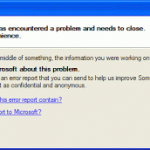Originally posted by oiaohm
View Post
Where's this "optimized" runtime? Links?
Originally posted by oiaohm
View Post
Originally posted by oiaohm
View Post
This fucking mentality of "there is only one standard library implementation" needs to stop. NOW.
You know even that guy proves you wrong. He outlines what's safe to pass and what isn't. You're the only one still refusing to admit your coding practice is pure trash and it's YOUR fault not Windows or anything else.



Comment